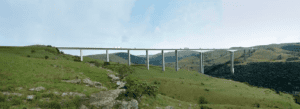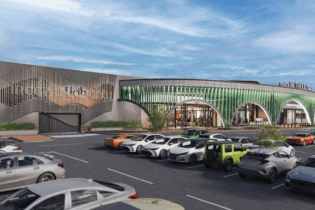
Architectural representation of the N2 Wild Coast Mtentu Bridge.
Construction on the R1.634 billion project is expected to start in early November 2017 and last approximately 40 months the roads agency said.
The tender forms part of the N2 Wild Coast road (N2WC) project and was awarded to the Aveng Strabag Joint Venture (JV) which consists of Aveng Grinaker-LTA, a major South African-based construction company and Strabag, a leading construction company in Europe with extensive experience in major balanced cantilever methodology bridge construction.
A first for SA
As the first of its magnitude in South Africa, the Mtentu Bridge will be one of the longest main span balanced cantilever bridges in the world and will reach heights of approximately 220m.
“Critically, it is going to create employment and business opportunities in the area. The whole of the project will be a growth engine for the Eastern Cape both during and post construction,” Vusi Mona, SANRAL’s Communications Manager said.
The construction of the 1.1km long bridge in a remote location is a major undertaking that requires specialised engineering skills and building techniques.
According to the roads agency, the bridge forms the backbone of the greenfields portion of the N2WC road project which is a national priority under coordination and direction of the Presidential Infrastructure Coordinating Commission (PICC) and one of government’s 18 Strategic Integrated Projects (SIPs) to support economic development and address service delivery in the poorest provinces.
Improving travel time
The entire project will play a vital role in improving travel time, connecting previously divided communities in the region and opening up opportunities in business and community-based tourism for the Wild Coast.
“By improving the travel time between Durban and East London by up to three hours for heavy freight and by providing a high mobility route through an area that is extremely isolated and underserved by road infrastructure, the route will have significant social and economic benefits and will act as a catalyst for local and regional development,” he said.








